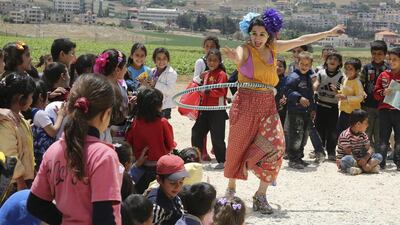KUWAIT CITY // Ali Al Nusf, a Kuwaiti accountant, took a troupe of merrymaking clowns into the dusty confines of Syrian refugee camps and hoped the ensuing antics would change the displaced peoples’ lives, if only for a moment.
He is one of the many Kuwaitis who donate, either financially or by volunteering their time, to efforts aimed at helping those affected by Syria’s three-year-old civil war.
While Kuwait is under international scrutiny for private donations that fund extremist groups in Iraq and Syria, it is also one of the biggest contributors of charity to those affected by the conflicts.
Kuwait’s Emir pledged US$500 million (Dh1.84 billion) in humanitarian aid for Syrians at the beginning of this year. Millions more in funding has been donated by private citizens.
For Mr Al Nusf, the clowns’ performances in Lebanon were intended to bring some simple amusement to the refugees.
The venture, which took place in June, became a personal affirmation for Mr Al Nusf that the disastrous affects of war can be alleviated through comedy.
Like many people in their late 20s, Mr Al Nusf dreamed big. After finishing his master’s degree in the United States in 2010, he tried selling a script to Hollywood. When that didn’t work he aimed to write a sitcom for Kuwaiti TV. That didn’t work out either. An attempt to establish a crowd-sourcing website was also unsuccessful.
For a time, Kuwait’s tense political atmosphere captured his attention. But when the drama of parliament dissolutions and street protests calmed, he looked for a new direction for his energy.
Inspiration arrived via an article about Clowns Without Borders, a non-profit volunteer group that entertains victims of conflict and disaster.
“When I saw what these guys were doing it was quite a change from politics,” Mr Al Nusf said. The notion of clowns travelling the world and helping people through humour appealed to him. He contacted the group in January and for the first time joined efforts to aid Syrians.
Asked why he thought Kuwaitis gave so much to the victims of the Syrian conflict, Mr Al Nusf said: “I think a lot of people got excited about the Arab Spring and having a sense of solidarity with the others. The Syrians perhaps had it the worst in terms of the human tragedy.”
Clowns Without Borders was eager to entertain the Syrian refugees. Mr Al Nusf introduced them to Layan, a Kuwaiti aid organisation which could help raise the necessary funds.
Layan deployed a social media campaign to raise the funds using the Twitter hashtag #mynoseisred written in Arabic. Donors posted photos of themselves wearing the red nose of a clown. Within an hour money began to flow in.
“I was shocked. It was an amazing thing that they did this campaign, and they raised a lot of money,” said Sabine Choucair, the Lebanese team leader for Clowns Without Borders.
Even as the money came in, Mr Al Nusf had “all kinds” of worries. Clowns Without Borders and Layan, working over email, might miscommunicate. Violence and the threat of kidnapping in Lebanon posed a degree of risk to the clowns.
But most of all, Mr Al Nusf worried that the refugees would not like the clowns.
Ms Choucair, 33, who grew up during the Lebanese civil war and now gives social therapy training to refugees in Turkey, Jordan, and Lebanon, along with her work as a clown, said the performances “gives them one hour of laughter and laughter is good for the soul, for the body ... it takes people to another level ... It’s nice, it’s good, it’s different, and it’s helpful.”
With about $20,000 raised by the Layan campaign and after six-months of planning, three clowns arrived from the US and Chile on June 1 for two weeks of performances and workshops in northern Lebanon, the Bekaa Valley and Beirut. Ms Choucair also joined the group as a clown.
Despite Mr Al Nusf’s initial concerns, the refugees were delighted.
He described watching the faces of the refugees, young and old, gathering to watch the clowns, and, in some cases, volunteering to take part in the shows.
“It was beautiful to see them engaged happily for an hour, not thinking about how bad it was,” he said. “They are under pressure. They deserve happy memories.”
“Kids need happy memories even if they are brief.”
Seated in his spacious family home in Kuwait City, he reflected on what made Clowns Without Borders an appealing way to offer aid.
The group entertained and then left, he said. They were culturally aware and researched where they were going. They also had no political or religious affiliation.
“In this region these days a lot of people do it for credit or the benefit of their political party or their affiliation,” he said.
“We don’t need to be of the same region or background or religion” to work together.
After the experience with Clowns Without Borders, he wants to organise another project to aid Syrian refugees.
“It just takes some management and putting the right people together,” he said.
jvela@thenational.ae

